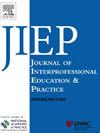跨专业教育(AAIPE)和协作实践设置的人工智能接受度量表的开发
Q3 Social Sciences
Journal of Interprofessional Education and Practice
Pub Date : 2025-04-11
DOI:10.1016/j.xjep.2025.100752
引用次数: 0
摘要
随着基于人工智能(AI)的工具在卫生和医疗保健环境中越来越普遍,准备担任卫生专业角色的学生将被越来越频繁地要求采用这些工具并将其整合到他们发展的知识和技能中。因此,了解人工智能的接受程度以及影响这种接受程度的因素,对于支持个人接受卫生人力角色培训及其在学科内和跨学科内的协作工作至关重要。本文描述了用于创建和验证跨专业教育人工智能接受度量表(AAIPE)的方法。这个经过验证的量表旨在衡量卫生部门学生对人工智能作为其工作场所角色和责任的一部分的接受程度。方法在多学科跨专业教育活动结束时采用AAIPE量表(N = 161)。结果对AAIPE结果的分析表明,量表项目具有中等至高度的内部一致性。学生参与者的AAIPE分数总体上显示中性至中等积极的接受水平,不同卫生部门学术课程的学生之间没有显著差异。本研究发现,学生对人工智能对职业道德的影响和人工智能对角色清晰度的影响的接受程度较低。还发现,人们对人工智能作为卫生部门工作不断发展的组成部分的接受程度有所提高。对这些结果与跨专业教育和实践的关系进行了讨论。本文章由计算机程序翻译,如有差异,请以英文原文为准。
Development of the AI Acceptance Scale for Interprofessional Education (AAIPE) and Collaborative Practice Settings
Background
As artificial intelligence (AI) based tools become a more prevalent part of the work taking place in health and healthcare settings, students preparing for health profession roles will be asked with increasing frequency to adopt and integrate these tools into their developing knowledge and skills-sets. Because of this, developing an understanding of levels of AI acceptance, and the factors that play into that acceptance will be essential for supporting individuals training for health workforce roles and their collaborative work within and across disciplines.
Purpose
This paper describes the methodology utilized to create and then validate the Artificial Intelligence Acceptance Scale for Interprofessional Education (AAIPE). This validated scale is intended to measure health sector student levels of acceptance of artificial intelligence as a part of their workplace roles and responsibilities.
Method
The AAIPE scale was utilized at the conclusion of multi-discipline interprofessional education activity (N = 161).
Results
Analysis of the AAIPE results indicated moderate-to-high levels of internal consistency for scale items. Student participant AAIPE scores indicated neutral-to-moderately positive levels of acceptance overall without significant difference between students from different health sector academic programs.
Conclusions
This research uncovered lower levels of student acceptance of artificial intelligence's influence on professional ethics and AI's influence on role clarity. Higher levels of acceptance relating to AI as an evolving component of health sector work were also found. A discussion of these results relating to interprofessional education and practice is conducted.
求助全文
通过发布文献求助,成功后即可免费获取论文全文。
去求助
来源期刊

Journal of Interprofessional Education and Practice
Social Sciences-Education
CiteScore
1.60
自引率
0.00%
发文量
80
期刊介绍:
Journal of Interprofessional Education & Practice, a quarterly online-only journal, provides innovative ideas for interprofessional educators and practitioners through peer-reviewed articles and reports. Each issue examines current issues and trends in interprofessional healthcare topics, offering progressive solutions to the challenges facing the profession. The Journal of Interprofessional Education & Practice (JIEP) is affiliated with University of Nebraska Medical Center and the official journal of National Academies of Practice (NAP) and supports its mission to serve the public and the health profession by advancing education, policy, practice & research.
 求助内容:
求助内容: 应助结果提醒方式:
应助结果提醒方式:


